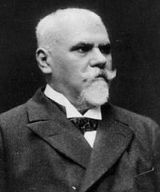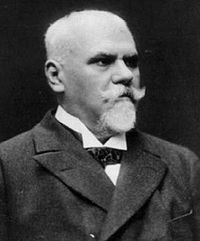
Justo Sierra
Encyclopedia

Mexico
The United Mexican States , commonly known as Mexico , is a federal constitutional republic in North America. It is bordered on the north by the United States; on the south and west by the Pacific Ocean; on the southeast by Guatemala, Belize, and the Caribbean Sea; and on the east by the Gulf of...
writer, journalist, poet and political figure of the second half of the nineteenth century. He was the son of Mexican novelist Justo Sierra O'Reilly
Justo Sierra O'Reilly
Justo Sierra O'Reilly , Mexican novelist and historian; father of Mexican author and political figure Justo Sierra Méndez...
, who is credited with inspiring his son with the spirit of literature. Sierra moved to Mexico City
Mexico City
Mexico City is the Federal District , capital of Mexico and seat of the federal powers of the Mexican Union. It is a federal entity within Mexico which is not part of any one of the 31 Mexican states but belongs to the federation as a whole...
at the age of 13 in 1861, the year of his father's death, and also, coincidentally, the year of the French intervention in Mexico
French intervention in Mexico
The French intervention in Mexico , also known as The Maximilian Affair, War of the French Intervention, and The Franco-Mexican War, was an invasion of Mexico by an expeditionary force sent by the Second French Empire, supported in the beginning by the United Kingdom and the Kingdom of Spain...
. Together with his fellow young students, Sierra responded with patriotic fervor to the invasion of his country, and became a lifelong militant liberal. His most enduring works are sociopolitical histories (at times verging on memoirs) of the era of Benito Juárez
Benito Juárez
Benito Juárez born Benito Pablo Juárez García, was a Mexican lawyer and politician of Zapotec origin from Oaxaca who served five terms as president of Mexico: 1858–1861 as interim, 1861–1865, 1865–1867, 1867–1871 and 1871–1872...
and Porfirio Díaz
Porfirio Díaz
José de la Cruz Porfirio Díaz Mori was a Mexican-American War volunteer and French intervention hero, an accomplished general and the President of Mexico continuously from 1876 to 1911, with the exception of a brief term in 1876 when he left Juan N...
, particularly his political biography of Juárez and his Evolución política del pueblo mexicano, which Antonio Caso considered the definitive statement of the age of the Reform in Mexico. He was elected a member of the Mexican Academy of Language in 1887, and served as the Academy's sixth director from 1910 until his death in 1912.
Public service
Elected to several terms as a representative in the federal Chamber of Deputies, Sierra also served the government in various posts. From 1905 to 1911 he agreed to serve as the Secretary of Public Education under the Díaz dictatorship; however, he never made a secret of his liberal sympathies and his distaste for the politics of the dictatorship. After the overthrow of Díaz and the election of Francisco I. MaderoFrancisco I. Madero
Francisco Ignacio Madero González was a politician, writer and revolutionary who served as President of Mexico from 1911 to 1913. As a respectable upper-class politician, he supplied a center around which opposition to the dictatorship of Porfirio Díaz could coalesce...
at the outset of the Mexican Revolution
Mexican Revolution
The Mexican Revolution was a major armed struggle that started in 1910, with an uprising led by Francisco I. Madero against longtime autocrat Porfirio Díaz. The Revolution was characterized by several socialist, liberal, anarchist, populist, and agrarianist movements. Over time the Revolution...
, Madero chose Sierra to serve as the Mexican ambassador to Spain
Spain
Spain , officially the Kingdom of Spain languages]] under the European Charter for Regional or Minority Languages. In each of these, Spain's official name is as follows:;;;;;;), is a country and member state of the European Union located in southwestern Europe on the Iberian Peninsula...
. He died in Madrid in 1912 while serving in his post; his remains were returned to Mexico, where Madero himself presided over his magnificent funeral.
Partial list of works
- Compendio de historia general, México, 1878
- Compendio de la historia de la antigüedad, México, 1880
- Confesiones de un pianista, México, 1882
- Historia general, México, 1891
- Cuentos románticos, México, 1896, 1934, 1946
- Juárez. Su obra y su tiempo, México, 1905–1906
- Historia de México. La Conquista. La Nueva España, Madrid, 1917
- Prosas, México, 1917
- Poemas, México, 1917
- Discursos, México, 1918
- Poesías, 1842-1912, México, 1938
- Evolución política del pueblo mexicano, México, 1941
- Justo Sierra. Prosas, México, 1939
- Obras completas, XV vols., México, 1948-1949.
See also
- Mexican literature

